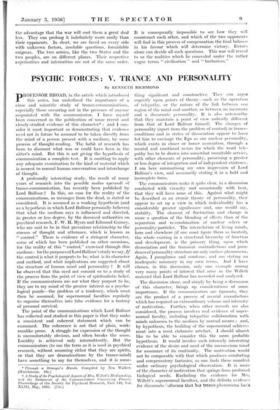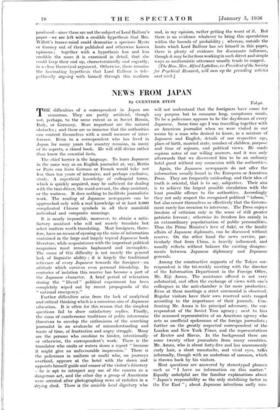PSYCHIC FORCES: V. TRANCE AND PERSONALITY
By KENNETH RICHMOND
pROFESSOR BROAD, in the article which introduced this series, has underlined the importance of a close and Scientific study of trance-communications, especially those occurring not in the presence of anyone acqUainted with the communicator. I have myself been concerned in the publication of some recent and closelystudied evidence of this character* : and I con- sider it most important as demonstrating that evidence need not in future be assumed to be Laken directly from the mind of a person present with a medium, by some procesi of thought-reading. The habit of research has been to discount what was or could have been in the sitter's mind. But this is not' giving the hypothesis of communication a complete test. It is omitting to apply any adequate examination to the kind of material which is nearest to normal human conversation and interchange of thought.
A profoundly interesting study, the result of many years of research into the possible modus operandi of trance-communication, has recently been published by Lord 13alfount In this, no case for the reality of the communications, as messages from the dead, is stated or considered. It is assumed as a working hypothesis (and as a hypothesis in which Lord Balfour personally believes) that what the medium says is influenced and directed, in greater or less degree, by the deceased authorities on psychical research, F. W. H. Myers and Edmund Gurney, who are said to be in that precarious relationship to the stream of thought and utterance, which is known as "control." There is evidence of a stringent character, some of which has been published on other occasions, for the reality of this "control," exercised through this medium : for the purposes of Lord Balfour's study we say, If the control is what it purports to be, what is its character and :method, and what implications are suggested about the structure of human mind and personality ? It will be observed that this need not commit us to a study of the process from the point of view of spiritualistic belief. If the communications arc not what they purport to be, they are to my mind of the greater interest as a psycho- logical puzzle—the problem of a tendency, which must then. be assumed, for supernormal faculties regularly to organise themselves into false evidence for a fantasy of personal survival.
The point of the communications which Lord Balfour has collected and studied in this paper is that they make a consistent and coherent statement which can be examined. The coherence is not that of plain, work- manlike prose. A struggle for expression of the thought is uncomfortably obvious, and often breaks the sense. Lucidity is achieved only intermittently. But the communicators (to use the term as it is used in psychical research, without assuming either that they are spirits, or that they are dramatisations by the trance-mind) have something to say for themselves, and it is some- * Through a Stranger's Hands. Compiled by Nea Walker. (Hutchinson. 16s.) t A Study of the Psychological Aspects of Mrs. Willett's Mediumship, and the Statements of the Communicators Concerning Process. Promedinga of the Society for Psychical Research, Part 140, Vol. XLIII, May, 1935. .(I5s.) thing significant and constructive. They can argue cogently upon points of theory—such as the operation of telepathy, or the nature of the link between one region of the mind and another, or between an incarnate and a discarnate personality. It is also noteworthy that they maintain a point of view radically different from that of Lord Balfour himself. The changes of. personality (apart from the problem of control) in trance- conditions and in states of dissociation appear to have led him to envisage the Ego as one nuclear personality, which exists in closer or looser association, through a mental and emotional nexus for which the word tele- pathy has to be drawn into somewhat unsuitable service, with other elements of personality, possessing a greater or less degree of integration and of independent existence. I am here summarising my own impression of Lord Balfour's view, and necessarily stating it in a bald and incomplete form.
The communicators make it quite clear, in a discussion conducted with Vivacity and occasionally with heat, that they will have none of this. Against what might be described as an atomic theory of personality, they appear to set up a view in which individuality has a considerably greater significance and, one would say, stability. The element of fluctuation and change is more a question of the blendirig of effects than of the separation and re-combination of nuclear selves or personality-particles. The interrelation of living in here and elsewhere (if one must figure them as located), the whole existing in a structural hierarchy of function and development, is the primary thing, upon which dissociation and the transient contradictions and para- doxes of personality-structure are only surface-phenomena: Again, I paraphrase and condense, and am stating an inadequate summary in my own terms. And I have chosen, in this discussion, only one example among very many points of interest that arise in the Willett material that Lord Balfour has recorded and analysed.
The discussion alone, and simply by being a discussion of this character, brings up considerations of some importance. If the communicators arc figments, they are the product of a process of mental manufacture which has required an extraordinary volume and intensity of motivation. Further, when other records are also considered, the process involves real evidence of super- normal faculty, including telepathic collaboration with minds unknown to the medium by normal means ; and, by hypothesis, the building of the supernormal achieve- ment into a most elaborate artefact. I should almost like to be able to consider this the more probable hypothesis. It would involve such intensely interesting evidence' of the 'desire and need of the unconscious mind for assurance of its continuity. The motivation would not be comparable With that which produces comforting and compensatory fantasies, as one finds these manifest under ordinary psychological observation. It is more of the character of motivation that springs from profound biological needs. Excluding the evidence for Mrs. Willett's supernormal faculties, and the definite evidence for .discarnate './.1fluence that her trance-phenomena haVa produced—since these are not the subject of Lord Balfour's paper—we are left with a credible hypothesis that Mrs. Willett's trance-mind could dramatise a specious Myers or Gurney out of their published and otherwise known Opinions; together with a hypothesis less and less credible the more it is examined in detail, that she could keep their end up, characteristically and cogently, in a close theoretical argument. Otherwise, there remains the fascinating hypothesis that Lord P.alfour is tele- pathically arguing with himself through this medium and, in my opinion, rather getting the worst of it. But there is no evidence whatever to bring this speculation within the bounds of probability ; whereas, outside the limits which Lord Balfour has set himself in this paper, there is plenty of evidence for discarnate influence, though it may be far from working in such direct and simple ways as mediumistic utterance usually tends to suggest.
[The lion. Mrs. Alfred Lyttelton, ex-President of the Society for Psychical Research, will sum up the preceding articles next week.]











































 Previous page
Previous page